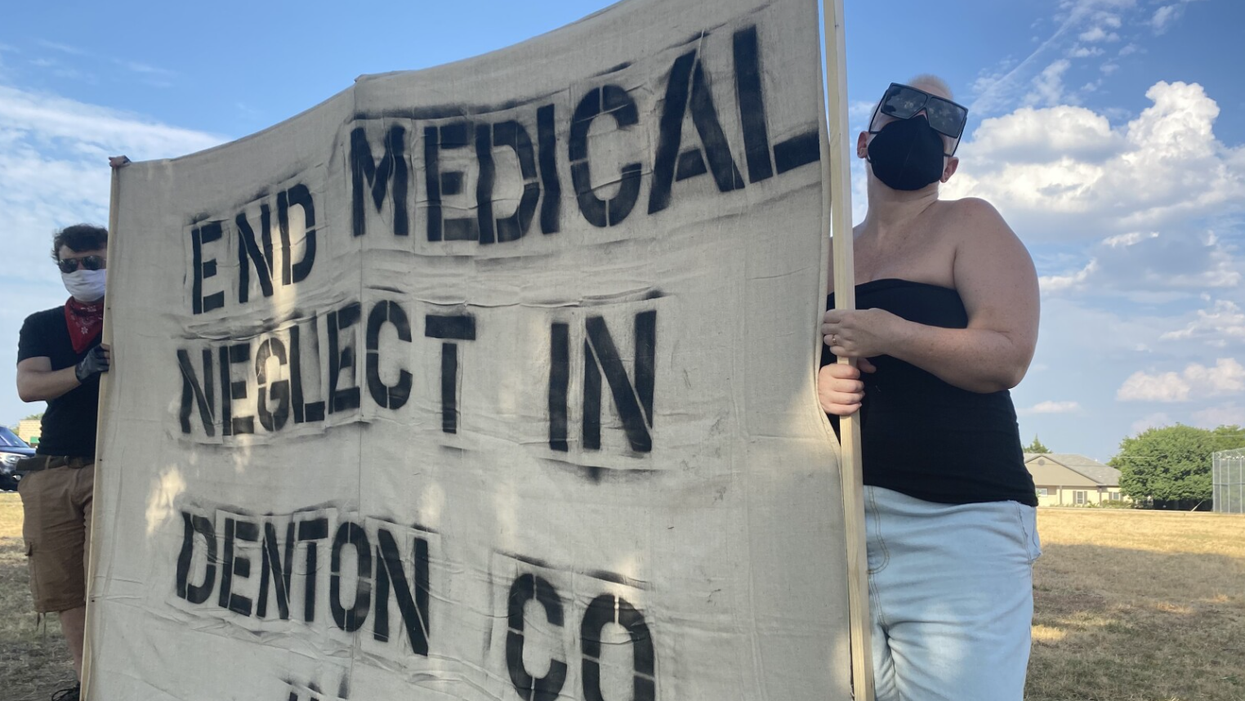When The State's Indifference Can Cost Your Right Arm -- Or Your Life

When Greg Corley was released from pre-trial custody on July 18, 2022, he didn’t celebrate his freedom. Instead he hightailed it to Parkland Hospital to have his stent flushed. Then he tried to schedule the amputation of his right arm.
It’s a result he can’t avoid. The flow of blood to his arm had been restricted for so long that severing the limb remains the only way to save his life.
Between March 6 and April 29, 2022, while he was detained at the Denton County Jail, Corley filed at least twenty-two medical grievances seeking medical attention for an arm that showed no signs of a pulse; all of the grievances were denied or closed administratively and Corely got no medical care for his arm.
“The only time I saw a physician at the jail was on March 1st, when I came back from having the first angiogram [to assess the stent]. And he [the doctor] said: ‘Yeah, well, we're not too worried about your arm. But I wonder, you sound a little upset. Would you mind taking a mild sedative while you're here?’”
He didn’t see a surgeon until May 4, 2022 and then the doctor told him “if you had come in before this we could have saved your arm.”
Corley says he told administrators: “I will come back and do my time gladly. But I don't want to die in jail.”
Now, Corley says amputation is the only way to prevent his dying from a blood clot, incarcerated not. “There's no choice and no option but amputation to keep from getting a blood clot,” he said in a recent interview.
Not only has the Prison Litigation Reform Act (PLRA) - a 1996 federal statute implemented, ostensibly, to reduce inmate litigation - erected more barriers to prevent prisoners from accessing the courts, the PLRA’s exhaustion requirement has heightened antipathy between inmates and guards. That is, the law pitched prisoners against staff and worsened what was already a relatively hostile dynamic.
The late Vincent Nathan, Professor of Law at the University of Toledo, surveyed Ohio inmates over 20 years ago about their attitudes toward the grievance/”administrative remedy” systems. The way facilities field complaints didn’t earn high marks.
In Nathan’s survey, 70.1 percent of inmates who used the system reported being retaliated against; moreover; 92 percent of them agreed with the statement, "I believe staff will retaliate or get back at me if I use the grievance process.” Eighty-seven percent of prisoners who didn’t avail themselves of the system agreed with the statement about staff retaliation. About six years later, half of inmates in a survey in New York reported retaliation for using formal channels of redress to deal with the conditions of confinement.
Wardens and officers confirmed the virtual guarantee of retribution for expressing ones needs or discontent. Only 21 percent of staff members surveyed disbelieved that reprisal didn’t happen; at least that’s what they told researchers. One warden admitted that counterattacks were “commonplace” when incarcerated people use the system built to receive and resolve their complaints.
Corley knew the risks of filing these formal requests for assistance. “I actually thought that [filing the grievances] was just, you know, adding that much more fuel to the fire for them to not treat me.” But he had no other choice if he ever needed to file suit to secure a court order for medical care.
The medical staff was blatant in delivering a tit for each of Corley’s grievance tats. Corley heard from nurses that he was medically blackballed at the Texas Jail.
“Dr. Marty Buchanan [Division Manager at Denton County Public Health] had told all the other nurses, do not treat me. Literally don't treat me. That's what one of the nurses said. He was like “look, man,we were told not to treat you. We all know that situation with your hand and you're on a physician-based care plan.” But yet I didn't see a physician,” Corley said.
This type of retaliation is illegal on its face. It’s also unconstitutional and that seems to be the only kind of violation that courts will duly examine when it comes to prisoners. Sometimes retaliation is a denial of due process under the 14th Amendment. Other times it’s a violation of the inmate’s First Amendment rights. Some statutes, like the Prison Rape Elimination Act, outlaw retaliation quite specifically.
But it’s hard to prove. The surplus of power jail guards enjoy provides cover for vengeance; it’s easy to make payback look like standard operating procedure. And the only place to get some relief is a federal courthouse - and getting there would require even more formal complaints, only inviting further retaliation.
Corley’s 22 grievances were less complaints than they were pleas for help; it may have been incompetence, bureaucratic malaise or retaliation in not providing him proper medical care. Whatever it was, law enforcement doesn’t allow for these delays or snubs for people living in society at large.
Prosecutors criminally charge gatekeepers who don’t properly triage requests for emergency assistance. Just last month, the Greene County, Pennsylvania District Attorney charged 911 dispatcher Leon Price with involuntary manslaughter, recklessly endangering another person, and official oppression and obstruction for not sending an ambulance when Diana Kronk’s daughter called for one after finding her unable to walk or speak and turning yellow; Price told her to call back when she was sure that her mother would consent to transport to the hospital. Kronk’s daughter had already assured Price that her mother would go. Kronk died from the lack of timely care.
Last year, the New Orleans, the Louisiana Police Department charged dispatcher Precious Stephens with malfeasance in office and interfering with an emergency communication for last year when she kept hanging up on callers without ascertaining where they were.
Another operator in Houston spent 10 days in jail and 18 months on probation after she disconnected thousands of calls prematurely and was recorded telling one caller “Ain’t nobody got time for this. For real.”
Corley doesn’t have time for this. He works as an electrician and in HVAC and he needs his dominant arm to earn a living. Although his future is uncertain, the most sadness comes to him when he tries to figure out how he will fulfill traditional fatherly duties like teaching his son to drive a car with standard transmission or building a treehouse.
The extremes of negligence in Corley’s case would have been very difficult to achieve with a patient who wasn’t incarcerated and not just because apathy and cruelty often abound in correctional facilities. It’s because regulatory law has almost no role to play in the places that need the most regulation.
Chandra Bozelko did time in a maximum-security facility in Connecticut. While inside she became the first incarcerated person with a regular byline in a publication outside of the facility. Her “Prison Diaries" column ran in The New Haven Independent, and she later established a blog under the same name that earned several professional awards. Her columns now appear regularly in The National Memo.








